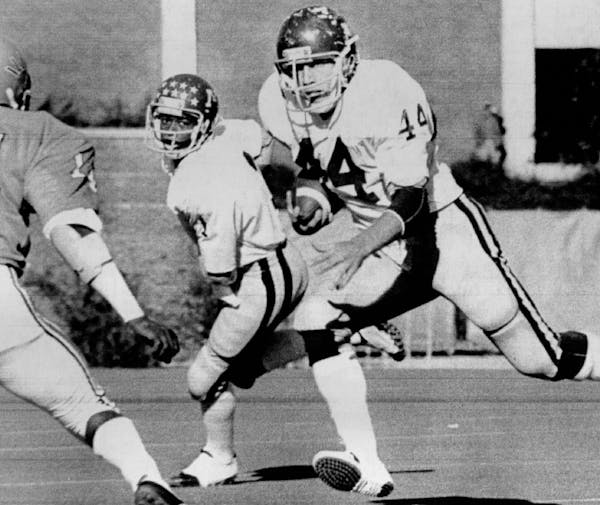The phrase perfectly expressed the mind-set of Michigan football fans in 2011, encapsulating all their pent-up frustration and wounded pride in six succinct words. "This is Michigan, for God's sake," coach Brady Hoke thundered at his introductory news conference, incredulous that someone would ask whether the job he had just taken should still be considered an elite one.
Hoke's impromptu motto became a battle cry for those yearning to reclaim the glory days of the winningest program in college football. But change the punctuation a bit, and those words now summarize the discontent with a team still mired in a decade-long downturn. As the Wolverines stumble into Saturday's Big Ten opener against the Gophers, a 2-2 start — including a 31-0 drubbing by Notre Dame and a lackluster home loss to Utah last week — has prompted fans to wail: "This is Michigan? For God's sake!"
Empty seats have begun to show at Michigan Stadium, where the Wolverines have slashed ticket prices to keep alive a 39-year streak of 100,000 or more fans at every game. In a short-lived promotion last week, two tickets for Saturday's game were free with the purchase of two Cokes at campus stores. Michigan has risen to the No. 1 spot in USA Today's "Misery Index," which measures the angst level of fans, and Hoke's Wikipedia page was altered last week to say he had been fired.
For fans raised on a diet of Big Ten titles and top-10 national rankings, these are strange days in Ann Arbor. While many remain hopeful their team will rise again — and some think Hoke still can lead a revival — its decline is testing the resolve of one of the largest fan bases in college football.
"Michigan fans want to win. They expect it. It's part of their DNA," said John U. Bacon, a Michigan graduate who has taught at the school and has written several books about its sports history. "When you see the parking lot [at Michigan Stadium] half-full, when you see a third fewer tailgates, it is not the same burst-at-the-seams atmosphere that Michigan has been known for for decades.
"[The mood of fans] is pretty dark. What I haven't seen in my lifetime is the growing indifference, almost an acceptance. Now at Michigan, there's a certain resignation. It's a weird place to be, but that's where they are."
Since going 11-2 and winning the Sugar Bowl in his first season, Hoke has compiled a 17-13 record. He got the job when Rich Rodriguez was fired after going 15-22 over three seasons, the worst coaching record in program history.
Michigan has won 42 Big Ten titles but none since 2004. Though the Wolverines finished 7-6 last year and lost five of their final six games, athletic director Dave Brandon said last summer that Hoke "is going to be here a long time." He has continued to stand behind Hoke despite this season's futility, which includes the Wolverines' first shutout loss in 30 years and a hapless showing against Utah that got the team booed off the field for the second week in a row.
The school projected student season-ticket sales of 13,000 to 14,000 this year — down from 21,000 two years ago. The largest announced crowd at Michigan Stadium this season was 106,811, about 3,000 short of capacity.
Team alumni have begun to vent their frustration. In a radio interview Tuesday, former quarterback Michael Taylor called the free-tickets-with-Coke promotion — which the university quickly canceled, blaming a miscommunication — "embarrassing" and "sad." Hoke has taken a beating on social media as well; multiple Twitter accounts and hashtags are devoted to his dismissal, with one tweet showing a photo of a 5-year-old girl holding a handmade "Fire Hoke" sign.
Rick Novak, a Twin Cities resident who played for coach Bo Schembechler during the 1970s, said former players of his era feel more disappointed than angry. He argued that another coaching change would only delay progress and said he and his friends are willing to be patient with Hoke, a former Wolverines assistant coach whose understanding of the program's "Michigan Man" ethos has won many admirers.
"We all have a little bit of frustration," Novak said. "It's kind of tough when you look at a conference that used to be the Big Two, and now you wonder, are you even in the top four any more? But we understand that change takes time."
Bacon traced the origin of Michigan's tailspin to 2007, when Appalachian State defeated the Wolverines in the season opener in Ann Arbor. That loss — one of the biggest upsets in college football history — shattered the mystique of the Big House, Bacon said, striking a blow to the program's sense of invincibility.
The team has been mostly mediocre — or worse — since then, creating a divide between longtime fans who viewed one loss as a crisis and a younger generation that has grown used to defeat. Novak noted that this year's freshmen were not born when Schembechler was coaching and were 8 years old when Michigan last won or tied for a Big Ten title.
Brandon Howe, president of the Michigan alumni association of the Twin Cities, is among those struggling with the current state of affairs. He also hasn't lost his belief that this is Michigan, for God's sake, which makes it impossible for him to write off the season — or the program.
"People who went through the Bo Schembechler era, it's hard for them to imagine what's happening right now," Howe said. "But most alumni and fans are relatively positive. I think when we look back on these times, it's going to be a hiccup."

Gophers women's athletics: This is what dominance looks like

Live: Twins vs. Angels. Follow the action on Gameview
Bevy of defensive playmakers are available in Round 2 of the NFL draft after historic offensive run

Live: Wolves vs. Suns in Game 3 of the playoffs. Follow it on Gameview.

